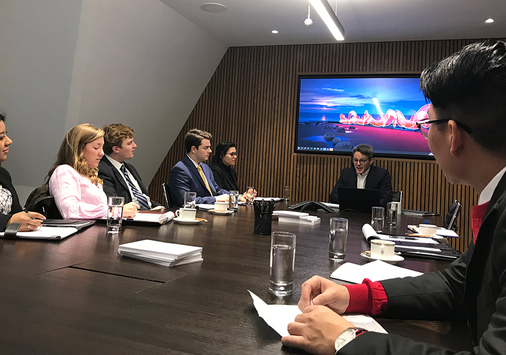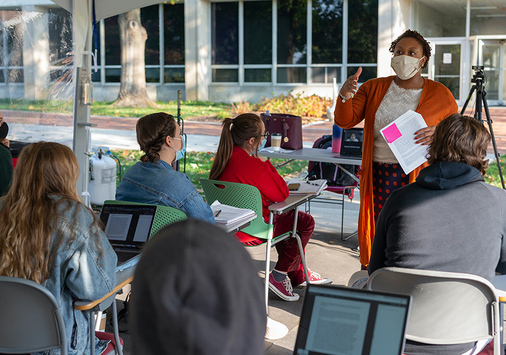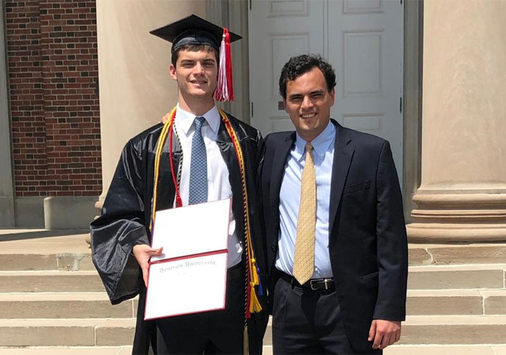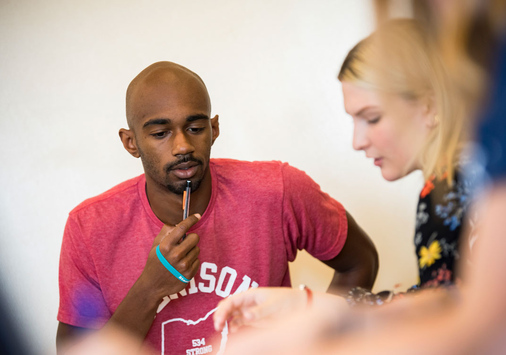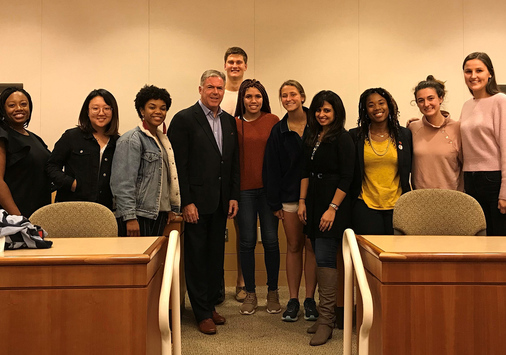Degree Requirements
Global Commerce Major
Required Components (16 courses - 60.5 credits total)
- 8-course Commerce Core: 6 GC Commerce Core, 2 Econ (28.5 credits)
- 2 intermediate language courses (i.e., two courses beyond the 112 level) (8 credits)
- 6-course Global Focus (24 credits)
- 1 Off-Campus Experience
Commerce Core
The Commerce Core is required of all majors. The Core consists of eight courses:
| Code | Title |
|---|---|
| ECON 101 | Introductory Macroeconomics |
| ECON 102 | Introductory Microeconomics |
| GC 101 | Commerce and Society |
| GC 200 | Global Focus Proposal for Global Commerce (prerequisite GC 101) |
| GC 201 | Elements of Commerce (prerequisite GC 101) |
| GC 202 | Quantitative Methods for Global Commerce (prerequisite GC 101) |
| GC 301 | Global Trade and Financial Markets (prerequisites ECON 101, ECON 102, GC 101, & GC 201) |
| GC 401 | Global Commerce Senior Seminar (prerequisites GC 101, GC 201, GC 202, GC 301) |
Language Courses
All Global Commerce majors are required to attain depth in a language other than English, typically by taking at least two language courses beyond the 112 level. Additional language study is strongly encouraged, and any additional language courses can apply toward the Global Focus–including introductory level courses in a third language relevant to the student's global focus region. If students are already native speakers of a language other than English, they must still fulfill the language requirement of the Global Commerce major by studying at least two semesters of a language other than English.
Global Focus
The Global Commerce major seeks to integrate the study of commerce with a deep understanding of the cultures and societies of a geographical region beyond North America. Courses in the Global Focus are drawn from the Humanities, Arts, and Social Sciences. Majors choose one of the following geographic areas as a Global Focus:
- Africa/Middle East
- Asia
- Europe
- Latin America/Caribbean
The Global Focus consists of six courses (a list of qualifying courses is available from the Global Commerce office each semester), at least four of which must address the particular region of study. Two of the courses can be cognates that relate to global commerce generally, but do not necessarily focus on the student’s selected region. Up to three of the Global Focus courses may be taken off-campus. Any exceptions must be approved by the Global Commerce Director in consultation with the Global Commerce committee. Students will develop a cohesive curricular plan for their Global Focus in the sophomore seminar class, GC 200 - Global Focus Proposal for Global Commerce.
Transregional Option
The Global Focus component of the major also can be fulfilled through a “transregional option.” In this option, students focus on the flow and exchange of a variety of elements—such as information, goods, services, or labor—between two or more geographic regions. The proposal must make a clear case for the pursuit of the transregional option and for the coherence of their six proposed Global Focus courses. Students electing to pursue the transregional option must still meet the Global Commerce language requirement.
Off-Campus Study
An off-campus experience is required of Global Commerce majors. Ideally, the off-campus experience occurs in the geographical region of the Global Focus or is tied to the Global Focus in terms of topics of study. In the GC 200 - Global Focus Proposal for Global Commerce proposal assignment, students are required to indicate and explain the rationale supporting their choice of an off-campus experience. The types of experiences that would fulfill the Global Commerce off-campus requirement include:
- Semester (or summer) of participation in a Denison-approved Off-Campus Study program.
- A Denison Seminar or other academic course with a travel component.
- An off-campus internship. This may be an international internship or a domestic internship where the student learns about the global connections of a U.S. business or organization.





